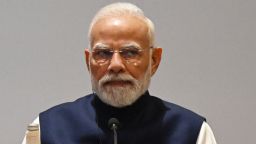
U.S. President Donald Trump asserted that Indian Prime Minister Narendra Modi had committed to halting oil imports from Russia, a claim that India has categorically denied. This development indicates that the ongoing tension between the United States and India over energy sourcing is unlikely to be resolved soon.
On March 15, 2024, Trump stated that Modi had assured him that India would cease purchasing oil from Russia, which is currently under U.S. sanctions. Trump described this as a “big step” in the right direction. However, the following day, Randhir Jaiswal, spokesperson for India’s foreign ministry, responded by saying he was “not aware of any conversation” regarding such an assurance from Modi. India’s foreign ministry emphasized the nation’s status as a “significant importer of oil and gas” without directly referencing either Russia or Trump’s statements.
India’s energy policy aims to ensure stable prices and secure supplies. The foreign ministry reiterated its commitment to diversifying energy sources to adapt to market conditions. Since the onset of the war in Ukraine in 2022, India has significantly increased its purchases of Russian oil, becoming one of Russia’s top clients. This is despite U.S. pressures to limit imports from Moscow, reflecting India’s prioritization of its energy needs against the backdrop of a growing population exceeding 1.4 billion.
Trump previously imposed a 25% tariff on India in August 2023, citing the country’s continued imports of Russian oil and gas. Analysts suggest that India cannot abruptly stop these imports. According to Muyu Xu, a senior oil analyst at the trade intelligence firm Kpler, halting purchases from Russia, its largest supplier, would be nearly impossible. Xu noted that Russia has supplied approximately 1.7–1.8 million barrels per day in recent months, making it difficult for India to find alternative sources quickly.
Data from Kpler reveals fluctuations in Indian oil procurement, with state-owned refiners reducing Russian purchases in recent months, while some private entities increased their intake. For instance, the state-owned Indian Oil Corporation Limited bought 10.35 million barrels of Russian oil in January 2024, but this figure dropped to 4.62 million barrels by September. As of October, the corporation had already procured 7.03 million barrels this month.
India’s refusal to comply with U.S. demands aligns with Modi’s political narrative as a strong leader focused on national interests. Recent diplomatic engagements between New Delhi and Washington reflect an effort to mend their relationship, with trade delegations discussing ways to bridge gaps in negotiations.
Earlier this month, Indian Foreign Minister S. Jaishankar acknowledged existing issues with the United States, attributing much of the tension to unresolved trade matters. He stated that both countries had “not arrived at a landing ground for our trade discussions,” but reaffirmed India’s commitment to finding solutions.
As the situation evolves, it remains clear that India is prioritizing its energy security and economic interests over external pressures, a stance that could have significant implications for international relations and energy markets moving forward.






